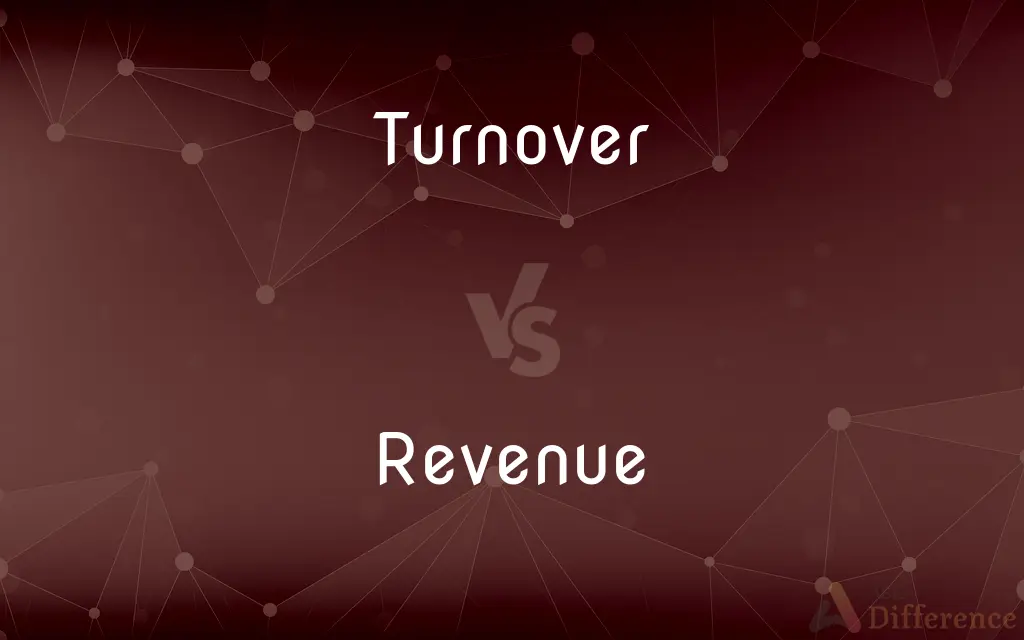Turnover vs. Revenue — What's the Difference?
By Tayyaba Rehman — Updated on June 12, 2024
Turnover refers to the total sales made by a business, whereas Revenue is the income earned before any expenses are subtracted. Both involve incoming money but can be used in different contexts.

Difference Between Turnover and Revenue
Table of Contents
ADVERTISEMENT
Key Differences
Turnover denotes the total sales or the amount of money taken by a business in a particular period. In contrast, Revenue symbolizes the income that a company generates before any expenses, including debts, taxes, and operating costs, are deducted.
Turnover can also imply the rate at which assets, like inventory or investments, are replaced or sold within a particular period. However, Revenue strictly refers to the total income received from the company’s primary activities like sales of goods or services.
Turnover, in a non-financial context, can also refer to the rate at which employees leave and join a company, indicating the stability of the workforce. Whereas, Revenue maintains its definition related strictly to the financial income of an entity.
In certain global regions, Turnover is sometimes used interchangeably with Revenue when discussing financial reports, implying the total receipts from sales. Nonetheless, Revenue is universally understood in financial terms, representing the gross income of a business.
Turnover might be used to gauge the efficiency or effectiveness of an entity's asset usage or staff retention. On the flip side, Revenue is a critical indicator of a company’s performance, often analyzed to comprehend the business’s growth and profitability.
ADVERTISEMENT
Comparison Chart
Definition
Total sales or employee retention rate
Income before expenses
Financial Context
Sometimes synonymous with revenue in specific regions
Universally recognized as total income
Non-financial Context
Can refer to employee or asset movement
Always pertains to income
Analytical Usage
Used to assess asset utilization or staff retention
Used to evaluate a company’s performance
Application
Can pertain to various business aspects (financial/HR)
Strictly pertains to financial context
Compare with Definitions
Turnover
The total sales generated by a company.
The small retailer had an annual turnover of $500,000.
Revenue
The financial income generated by a business entity.
The revenue of the tech company has grown this quarter.
Turnover
The rate of employee exits and hires.
The company is addressing its high turnover rate.
Revenue
Money received from the sale of goods/services.
Ticket sales constituted a major part of the revenue.
Turnover
The rate of selling and replacing inventory.
The shop has rapid turnover in fresh produce.
Revenue
The total income before deducting any expenses.
The company's revenue exceeded projections.
Turnover
The amount of money taken by a business in a particular period
A turnover approaching £4 million
Revenue
In accounting, revenue is the income or increase in net assets that an entity has from its normal activities (in the case of a business, usually from the sale of goods and services to customers). Commercial revenue may also be referred to as sales or as turnover.
Turnover
The rate at which employees leave a workforce and are replaced
High staff turnover left the program with too many young instructors
An annual turnover of staff as high as 100%
Revenue
Income, especially when of an organization and of a substantial nature
Traders have lost £10,000 in revenue since the traffic scheme was implemented
Turnover
A small pie made by folding a piece of pastry over on itself to enclose a sweet filling
An apple turnover
Revenue
The income of a government from all sources appropriated for the payment of the public expenses.
Turnover
(in a game) a loss of possession of the ball to the opposing team
The team were sitting on their lead and taking care to avoid turnovers
Revenue
Yield from property or investment; income.
Turnover
The act or fact of turning over
Preventing the turnover of vehicles in accidents.
Revenue
All the income produced by a particular source.
Turnover
An abrupt change or transfer, as of power or ownership.
Revenue
A governmental department set up to collect public funds.
Turnover
A small pastry made by covering one half of a piece of dough with a filling, folding the other half over on top, and sealing the edges.
Revenue
The income returned by an investment.
Turnover
The number of times a particular stock of goods is sold and restocked during a given period of time.
Revenue
The total income received from a given source.
Turnover
The amount of business transacted during a given period of time.
Revenue
All income generated for some political entity's treasury by taxation and other means.
Turnover
The number of shares of stock sold on the market during a given period of time.
Revenue
(accounting) The total sales; turnover.
Turnover
The number of things that are replaced by others of the same kind, or the rate at which this happens
The turnover of red blood cells.
A rapid turnover of hospital patients.
Revenue
(accounting) The net income from normal business operations; net sales.
Turnover
The number of workers that have left a workplace or industry and been replaced in a given period of time, or the rate at which this happens.
Revenue
(figurative) A return; something paid back.
Turnover
The ratio of this number to the number of employed workers in a workplace.
Revenue
(intransitive) To generate revenue.
Turnover
(Sports) A loss of possession of the ball or puck to the opposing team, as by a misplay or an infraction of the rules.
Revenue
(transitive) To supply with revenue.
Turnover
Capable of being turned or folded down or over
A turnover collar.
Revenue
That which returns, or comes back, from an investment; the annual rents, profits, interest, or issues of any species of property, real or personal; income.
Do not anticipate your revenues and live upon air till you know what you are worth.
Turnover
The amount of money taken as sales transacted in a given period.
The company had an annual turnover of $500,000.
Revenue
Hence, return; reward; as, a revenue of praise.
Turnover
The frequency with which stock is replaced after being used or sold, workers leave and are replaced, a property changes hands, etc.
High staff-turnover can lead to low morale amongst employees
Those apartments have a high turnover because they are so close to the railroad tracks.
Revenue
The annual yield of taxes, excise, customs, duties, rents, etc., which a nation, state, or municipality collects and receives into the treasury for public use.
Turnover
A semicircular pastry made by turning one half of a circular crust over the other, enclosing the filling (usually fruit).
They only served me one apple turnover for breakfast.
Revenue
The entire amount of income before any deductions are made
Turnover
(sports) A loss of possession of the ball without scoring.
The Nimrods committed another dismaying turnover en route to another humiliating loss.
Revenue
Government income due to taxation
Turnover
A measure of leg speed: the frequency with which one takes strides when running, typically given in strides per minute.
Revenue
Earnings obtained from a company’s primary activities.
Product sales are the primary source of revenue.
Turnover
The act or result of overturning something; an upset.
A bad turnover in a carriage
Revenue
The overall financial yield from operations.
Advertisements significantly boost the website’s revenue.
Turnover
(dated) An apprentice, in any trade, who is handed over from one master to another to complete his time.
Turnover
Capable of being turned over; designed to be turned over.
A turnover collar
Turnover
The act or result of turning over; an upset; as, a bad turnover in a carriage.
Turnover
A semicircular pie or tart made by turning one half of a circular crust over the other, inclosing the fruit or other materials; as, an apple turnover.
Turnover
An apprentice, in any trade, who is handed over from one master to another to complete his time.
Turnover
Admitting of being turned over; made to be turned over; as, a turnover collar, etc.
Turnover
The ratio of the number of workers that had to be replaced in a given time period to the average number of workers
Turnover
Made by folding a piece of pastry over a filling
Turnover
The volume measured in dollars;
The store's dollar volume continues to rise
Turnover
The act of upsetting something;
He was badly bruised by the upset of his sled at a high speed
Turnover
The amount of business done in a given time.
The turnover in the holiday season spiked significantly.
Turnover
The number of times a particular asset is replaced.
The fund had a 20% turnover in equities last year.
Common Curiosities
Can turnover sometimes be used similarly to revenue?
Yes, in some regions, turnover might equate to total sales.
Is revenue always related to finance and accounting?
Yes, it always pertains to the income of a business.
Does revenue consider company expenses?
No, revenue does not account for deductions or expenses.
How does high turnover impact a business?
It might indicate instability or imply more recruitment/training costs.
Is turnover always a financial term?
No, it can refer to employee retention rates too.
Can turnover refer to inventory management?
Yes, it can indicate how frequently inventory is sold/replaced.
Is revenue impacted by employee retention?
Not directly, but employee retention might indirectly impact it.
Is a business with high turnover always successful?
Not necessarily, as the term can refer to several different aspects.
Does higher revenue always imply profit?
No, as profit is determined after subtracting all expenses.
Does turnover indicate business profitability?
Not directly, but it can show the effectiveness in aspects like inventory management.
Can a company have high revenue but low profit?
Yes, if the expenses are also high, profit can be low despite high revenue.
Share Your Discovery

Previous Comparison
Grandma vs. Granny
Next Comparison
Resalable vs. ResaleableAuthor Spotlight
Written by
Tayyaba RehmanTayyaba Rehman is a distinguished writer, currently serving as a primary contributor to askdifference.com. As a researcher in semantics and etymology, Tayyaba's passion for the complexity of languages and their distinctions has found a perfect home on the platform. Tayyaba delves into the intricacies of language, distinguishing between commonly confused words and phrases, thereby providing clarity for readers worldwide.
















































